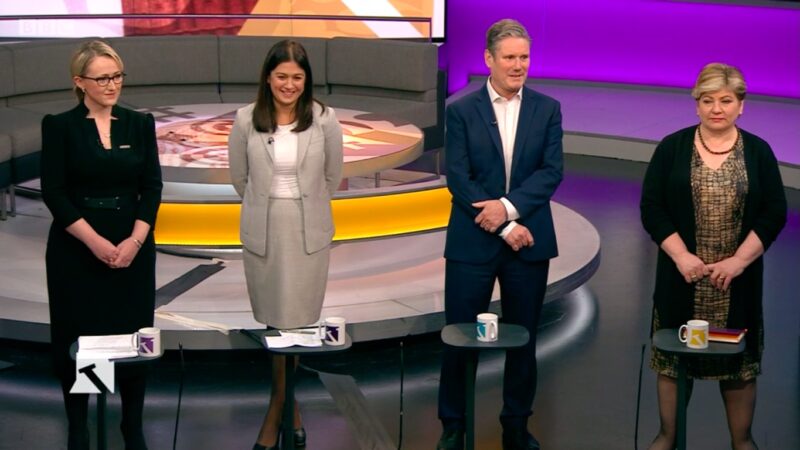
The UK’s post-Brexit future
Lisa Nandy and Rebecca Long-Bailey took markedly different positions to Keir Starmer and Emily Thornberry, which reflected their stances on Brexit over the last few years. Nandy reminded everyone that she was a Remainer initially, but respected the outcome of the referendum. Long-Bailey talked about the “palpable” anger from people in her constituency, and made the case for looking beyond Brexit to a future outside Europe. Starmer also tried to do this but fell down a bit as he couldn’t quite rule out customs union or single market membership when asked ‘yes or no’ several times. Similarly, Thornberry only wanted to emphasise that the UK should keep a close relationship with its EU neighbours.
Labour’s handling of antisemitism
Long-Bailey, Nandy and Starmer all cited tackling antisemitism as their first priority as the next leader. Asked whether as Labour leader they would see suspended national executive committee representative Pete Willsman expelled from the party, both Starmer and Thornberry answered emphatically yes. Nandy and Long-Bailey chose to point out that – under the new disciplinary process to which all candidates have signed up – this would not be the decision of the Labour leader but of an independent body.
Thornberry’s Newsnight claim that Long-Bailey had not spoken out on antisemitism in the shadow cabinet was raised again. The Shadow Business Secretary insisted that she had done so, before adding: “We can have a competition between us all about who spoke out the most.. But all of us did not do enough on this issue. I take responsibility for that.”Taking a swipe at her frontbencher rivals, Nandy said: “Sitting in the shadow cabinet, asking for reports, not receiving them and staying silent is not good enough.”
Long-Bailey had a question directed solely at her about whether she had supported the IHRA definition of antisemitism. She said yes, but admitted that she had not been pushing for the examples, which was central to the arguments over the summer on this subject. Meanwhile, Thornberry offered further insights into her poor relations with the leader’s office. She claimed that when she tried to raise the issue, staffers said it was “none of her business”.
Signing the trans rights pledges
Transgender rights came up again as the candidates were asked to support a set of pledges circulated on social media that committed to expelling members for expressing transphobic views. Long-Bailey and Nandy reiterated their support for the pledges. Starmer maintained his line that “trans rights are human rights” but he would not commit either way on the pledges. Long-Bailey directly challenged an audience member supportive of Woman’s Place UK to say that “trans women are women and trans men are men”, for which she received a round of applause.
Key priorities as Labour leader
Asked what their priorities would be as Labour leader, three cited antisemitism first. Starmer also talked about unity – after all, the frontrunner has consistently pitched himself as the unity candidate. He asserted that the party had to “pull together” no less than three times throughout the debate and twice in his opening statement. Nandy said she would “get investment back into areas that have seen 40 years of economic decline”, mirroring her focus on towns in the northern and midlands ex-Labour heartlands lost in December. Thornberry said she would focus on fighting back in opposition, which aligns with her emphasis on being the candidate with the most fight and therefore best-placed to beat Boris Johnson. Long-Bailey highlighted her interest in policy, saying she would develop a “transformational” programme.
Net-zero by 2030
Starmer refused to be drawn on the commitment to reach net-zero carbon emissions by 2030, stating that time was against the Labour Party on this considering that they would not be in power until 2024 at the earliest. The Holborn MP said that he would want to commit to the target but “we just lost a general election… if we can reach that in six years, then great”.
Thornberry agreed with Starmer and simply said that “we lost the opportunity to take a leadership role”. Nandy claimed “you can’t answer yes/no” on the matter. But Long-Bailey replied with an emphatic “yes”, declaring that she has a plan and that the party needed to be “unambiguous” with its members on this issue.




More from LabourList
‘Factionalism at the top Is weakening Labour – and handing a gift to Reform’
‘Europe must stand strong on its own as US security guarantees grow conditional’
‘Tackling poverty should be the legacy of Keir Starmer’s government’